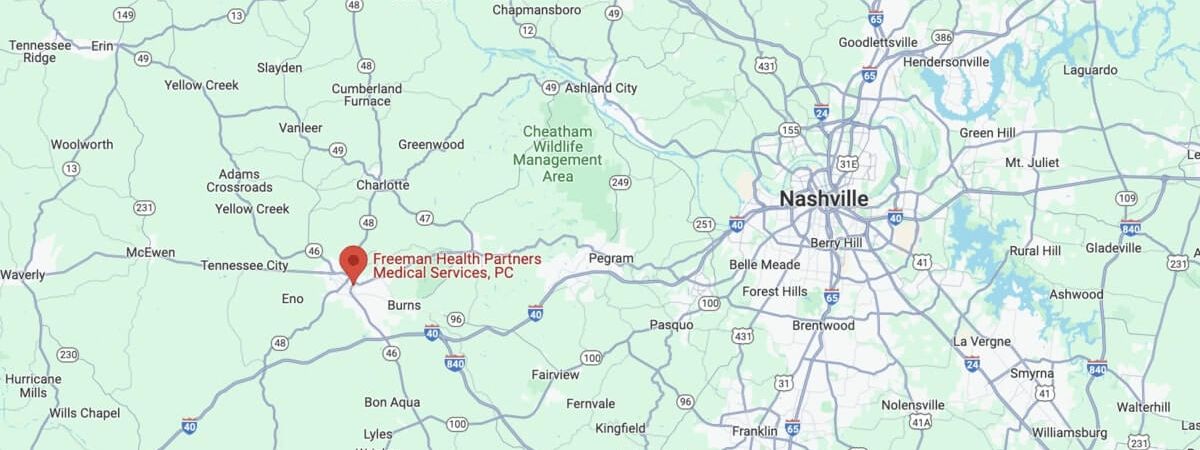Cost of Transcranial Magnetic Stimulation (TMS) Treatment and Therapy
Cost of TMS Treatment
Near Nashville, Tennessee
Near Nashville, Tennessee
Freeman Health Partners offers therapy programs and primary care services in Tennessee, including specialized treatments like Transcranial Magnetic Stimulation (TMS) in Nashville. When considering TMS treatment, it’s essential to explore the potential costs involved. We’ll take a closer look at the pricing for TMS treatment and what factors can influence TMS therapy expenses.
Alongside TMS, Freeman Health Partners provides therapy programs that focus on mental health, dual diagnosis, and primary care. These services are designed to offer personalized care, for a wide range of needs. As we explore options, we’ll also examine how pricing for TMS treatment aligns with quality care and your best outcomes.

What is TMS?
Transcranial Magnetic Stimulation (TMS) is a non-invasive therapy that uses magnetic fields to target nerve cells in the brain, primarily stimulating areas associated with mood regulation. TMS is commonly used to treat conditions like depression when other treatments, such as medication or psychotherapy, have not been effective.
This therapy involves placing a magnetic coil near the scalp, delivering painless pulses to specific brain regions. Sessions are typically brief, and TMS does not require anesthesia or result in significant side effects. It’s an increasingly popular treatment for those seeking alternatives to traditional mental health approaches.
Is TMS Treatment Safe?
Yes, TMS treatment is considered safe for most patients. It’s FDA-approved and involves minimal risk, with the most common side effects being mild scalp discomfort or headaches that usually fade after a few sessions. Serious side effects are rare, making it a safe option for many people seeking mental health treatment.
TMS treatment does not involve surgery, anesthesia, or medications, making it a non-invasive alternative for managing conditions like depression. The procedure is typically well-tolerated, with patients able to resume daily activities immediately after each session. Safety protocols are followed closely to ensure the anxiety treatment is both effective and low-risk.
How Does TMS Treatment Work?
TMS treatment works by delivering magnetic pulses to specific areas of the brain associated with mood, cognitive function, and emotional well-being. These pulses stimulate nerve cells, helping to improve psychological health by targeting regions involved in mental health disorders. TMS is often used when traditional behavioral therapy or medications are not successful.
This therapy is particularly beneficial for psychiatric conditions like depression, anxiety, and OCD. By enhancing communication between brain regions, TMS supports long-term improvements in both cognitive function and emotional regulation. As a non-invasive treatment, it offers a promising alternative for those struggling with chronic mental health disorders.
How to Find a TMS Treatment Center Near Me in Nashville, Tennessee
To find a TMS treatment center in Nashville, start by researching local clinics that specialize in mental health TMS therapy. For more options, explore alternative centers in nearby areas like Dickson, TN. For personalized assistance and to discuss your needs, call Freeman Health Partners today at (615) 879-3582 for guidance and information on available treatment options.

Mental Health TMS Treatment and Therapy Services in Dickson, TN
In Dickson, TN, mental health TMS treatment is available at Freeman Mental Health’s dedicated facility located at 222 State Street, Dickson, TN 37055. Our center offers specialized TMS therapy to address various mental health conditions, providing a convenient option for those seeking effective treatment in the Middle Tennessee area. Contact us today.
Alternative Ways to Find Treatment in Middle Tennessee
Here are alternative ways to find TMS treatment in Middle Tennessee:
- Online Directories: Search online mental health resources that list TMS providers. Websites like Psychology Today offer directories for therapy sessions and mental health support.
- Primary Care Physician: Your doctor can suggest wellness and mental health centers that offer TMS treatment and coping strategies.
- Mental Health Associations: Contact mental health advocacy groups for referrals. They can guide you to facilities focused on therapy sessions and psychotherapy techniques.
- Insurance Provider: Review your insurance network for mental health awareness and TMS treatment options that align with self-care practices and mental health resources.
Free Mental Health Assessments

What Mental Health Disorders are Treated with TMS in Tennessee?
TMS in Tennessee is used to treat various mental health disorders, offering an effective option for those who haven’t responded to traditional treatments. Common conditions treated with TMS include depression, anxiety, OCD, PTSD, and addiction. These are just examples, and the therapy can be fit to address other psychiatric conditions as well.
Depression
TMS is often used to treat depression, particularly in those who haven’t found relief through medication or therapy alone. The magnetic pulses target brain regions involved in mood regulation, helping to alleviate symptoms of persistent depression. Many patients experience significant improvement, making TMS a valuable option for managing treatment-resistant depression.
Anxiety
TMS is also effective for treating anxiety, especially when traditional methods like medication and cognitive-behavioral therapy (CBT) haven’t provided sufficient relief. By stimulating brain areas associated with anxiety regulation, TMS helps to rebalance neural activity, reducing symptoms and improving overall emotional stability. It offers a promising alternative for those struggling with chronic anxiety disorders.
OCD
TMS is utilized for treating Obsessive-Compulsive Disorder (OCD) by targeting brain areas involved in obsessive thoughts and compulsive behaviors. The therapy helps to normalize brain activity patterns, which can lead to a reduction in OCD symptoms. For people who haven’t responded well to conventional treatments for OCD, TMS offers a non-invasive and effective alternative.
PTSD
TMS can be an effective treatment for Post-Traumatic Stress Disorder (PTSD) by targeting brain regions involved in fear and memory processing. By stimulating these areas, TMS helps to reduce the intensity of traumatic memories and alleviate symptoms such as flashbacks and hypervigilance. It provides a promising option for patients seeking relief from the persistent effects of PTSD.
Addiction
TMS is increasingly used to support addiction treatment by targeting brain areas associated with reward and impulse control. By modulating these brain regions, TMS helps reduce cravings and improve self-control, which can be crucial in the recovery process. It offers a complementary approach to traditional addiction therapies, enhancing overall treatment outcomes and supporting sustained sobriety.
How is TMS Different From Other Forms of Mental Health Treatment?
TMS is different from other treatments because it’s a non-invasive, drug-free therapy that uses magnetic pulses to target specific brain regions. Unlike medications that affect the entire body, TMS directly stimulates areas linked to mood regulation without systemic side effects. It’s also used when other treatments, like medication or talk therapy, have not been effective.
TMS is also beneficial because it requires no anesthesia, has minimal recovery time, and carries fewer risks than more invasive procedures like electroconvulsive therapy (ECT). While traditional treatments often rely on long-term medication management, TMS offers an alternative that specifically targets brain function, making it a unique option for treating resistant mental health and mood disorders.
What are the Benefits of TMS Treatment?
The benefits of TMS treatment include its effectiveness in improving mood and cognitive function for people with treatment-resistant mental health disorders. TMS is non-invasive, drug-free, and typically has fewer side effects compared to medications. It’s also well-tolerated, with most patients experiencing relief after a series of sessions.
Beyond its safety and minimal side effects, TMS offers long-lasting improvements in emotional well-being and psychological health. It’s especially beneficial for those who haven’t responded well to traditional therapies, providing a targeted approach that enhances brain function and reduces symptoms of depression, anxiety, and other psychiatric conditions.
What are Side Effects of TMS Treatment?
The side effects of TMS treatment are generally mild and may include scalp discomfort, headaches, or lightheadedness, which typically subside as treatment continues. Serious side effects, such as seizures, are rare. TMS is considered safe for most patients, making it an appealing option for those seeking non-invasive treatment for mental health disorders.
However, certain people may not be eligible for TMS treatment. People with metal implants in or near the head, such as cochlear implants or aneurysm clips, should avoid TMS due to potential risks. Additionally, those with a history of seizures or certain neurological conditions may not be suitable candidates, as the treatment could exacerbate these conditions.
Tennessee TMS Treatments and Mental Health Statistics
Transcranial Magnetic Stimulation (TMS) is believed to release neurotransmitters like serotonin, norepinephrine, and dopamine, which play a key role in regulating mood. Approved by the FDA in 2008, TMS has shown promising results for treating depression. Studies reveal that 79% of individuals treated with TMS, talk therapy, or medication alone experienced a clinically significant positive response.
Clinical reviews indicate that most adverse events associated with TMS are benign and transient. Additionally, daily TMS application to the prefrontal lobe over several weeks has been found effective in alleviating symptoms of depression, offering a valuable option for those seeking relief from this condition.
We Accept Most Major Insurance Providers in Tennessee
At Freeman Health Partners, we understand the financial concerns that accompany the decision to seek mental health and primary care services. That’s why we’re committed to making our services as accessible as possible by accepting most major insurance providers in Tennessee. This includes Aetna, Carelon, Blue Cross Blue Shield, Cigna, and Humana.
Our goal is to ensure that everyone who needs our help can receive it, regardless of their insurance coverage. We encourage you to take the first step towards better mental health by filling out our online form. This will allow us to determine your health insurance coverage levels for mental health and primary care services. By understanding what services your insurance covers, you can start your journey with confidence, knowing that you have the financial support you need.




Check Your Insurance By Phone

What Does a TMS Therapy Session Look Like?
A TMS therapy session involves the patient sitting comfortably in a chair while a magnetic coil is placed near the scalp. The device emits magnetic pulses that stimulate specific brain regions. Each session typically lasts about 30 to 40 minutes, with patients remaining awake and alert throughout the process.
During the session, patients may feel mild tapping or tingling sensations on the scalp, but it’s generally painless. Sessions are usually scheduled several times a week over a period of weeks. There’s no need for anesthesia, and most patients can resume their daily activities immediately after each session.
Does Private Health Insurance Cover TMS Treatment Costs Near Nashville, Tennessee?
Yes, private health insurance often covers the TMS treatment cost in Nashville, but coverage can vary by provider and plan. Insurers may offer cost-effective options for TMS treatment, making it more affordable for patients. The average cost of TMS treatment in Tennessee can be mitigated by insurance, improving mental health treatment affordability.
To ensure coverage, it’s important to verify with us at the Freeman Mental Health Program about the specific rates for TMS treatment and any potential out-of-pocket expenses. Many plans provide budget-friendly TMS treatment options, so reviewing your policy details can help you manage the cost effectively.
Which Commercial Health Insurance Providers Cover the Cost of TMS Treatment in Middle Tennessee?
Several major commercial health insurance providers cover the cost of TMS treatment in Middle Tennessee. These include Blue Cross Blue Shield, UnitedHealthcare, Aetna, Cigna, and Humana. Each of these insurers offers various plans that may include TMS therapy as part of their mental health treatment options.
Coverage specifics can vary, so it’s important to confirm your plan’s details. Understanding the criteria and co-payment requirements will help you manage the cost for TMS treatment effectively and make the most of your insurance benefits for TMS treatment.

How Much Does TMS Treatment Cost Near Nashville, Tennessee?
So, how much does TMS therapy cost near Nashville, TN? The treatment fees for TMS in Middle Tennessee typically range from $250 to $500 per session. TMS support pricing can vary based on clinic location, the length of the treatment plan, and additional services. Exploring affordable TMS treatment options and understanding what’s covered by insurance can help manage treatment costs.
For those seeking affordable mental health services, it’s crucial to discuss your needs with providers like Freeman Mental Health to find a suitable plan. Many clinics, including Freeman Primary Care, offer flexible payment options to make TMS treatment more accessible.
How Much Does TMS Treatment Cost With Health Insurance in Nashville?
With health insurance, the TMS treatment cost in Nashville, TN, typically ranges from $50 to $200 per session. This variation depends on factors such as your insurance plan’s deductible, co-insurance rates, and coverage specifics. The total cost will also be influenced by the number of sessions needed for effective treatment.
Insurance coverage can significantly reduce out-of-pocket expenses, but the exact amount you’ll pay depends on your plan’s details. To get a clear picture of your financial responsibility, it’s important to check with us at Freeman Health Partners about the specifics of your coverage and any potential co-payments or deductibles.
How Much Does TMS Treatment Cost Without Health Insurance Coverage in Middle Tennessee?
Without health insurance coverage, TMS treatment in Middle Tennessee typically costs between $250 and $500 per session. The price range varies depending on factors such as the clinic’s location, the number of sessions required, and any additional services included in the treatment plan.
The total cost can fluctuate based on individual treatment needs and the specific clinic’s rates. Private mental health rehab facilities cost variances depend on the facility; it’s important to discuss pricing with FHP to understand the full financial scope and explore any available payment options or discounts to make the treatment more manageable.

What is the Cost of TMS Testing and Assessments in Nashville?
The cost of TMS testing and assessments in Nashville can vary depending on the provider. However, Freeman Health Partners (FHP) offers a free assessment for those interested in TMS therapy to determine the best level of care. This free assessment helps eliminate upfront TMS treatment costs, making it more accessible.
Understanding mental health care costs, including TMS therapy expenses and pricing for TMS treatment, is crucial. By offering affordable options for TMS therapy, FHP helps patients receive necessary care without high treatment fees for TMS assessments. This commitment to accessible and affordable mental health services helps patients focus on treatment rather than TMS support pricing concerns.
Are There Free TMS Testing or Assessments in Middle Tennessee?
Yes, free TMS testing and assessments are available in Middle Tennessee. Freeman Health Partners offers a complimentary assessment for people considering TMS therapy. This evaluation helps determine the best level of care based on each patient’s needs. By providing a free assessment, FHP ensures that those seeking TMS treatment can access expert recommendations without worrying about upfront costs.
This no-cost evaluation is a key step in making TMS therapy more accessible to those in need. With FHP’s commitment to patient-centered care, they aim to reduce financial barriers and offer personalized guidance, giving you the most appropriate mental health support.
What is the Admissions Process for the TMS Treatment Program at FHP?
The admissions process for TMS treatment at Freeman Health Partners is straightforward and supportive. Each step, from initial contact to active treatment, is designed to ensure personalized care and a smooth experience. Here’s a brief overview of what to expect.
- Initial Inquiry and Contact: The admissions process begins with an initial inquiry, where potential patients reach out via phone or online to express interest in TMS treatment. During this stage, the team gathers preliminary information, answers questions, and schedules a consultation, ensuring that each person’s needs are understood from the start.
- Comprehensive Assessment and Evaluation: After initial contact, patients undergo a thorough evaluation assessment and evaluation, including a detailed medical and mental health history review. This helps the clinical team determine if TMS is the appropriate treatment option. The evaluation may involve discussions with a psychiatrist or mental health professional for a tailored approach.
- Insurance Coverage and Financial Verification: Next, the admissions team works on verifying insurance coverage to determine the extent of benefits and out-of-pocket costs. This step involves reviewing the patient’s insurance policy and confirming what portion of TMS treatment will be covered. The team provides transparent financial information to help patients make informed decisions.
- Customized Treatment Plan Creation: Based on the assessment, a personalized TMS treatment plan is developed. This plan includes the recommended number of sessions, treatment frequency, and integration with any other ongoing mental health therapies. The plan is designed to target specific needs and optimize the benefits of TMS therapy.
- Seamless Admissions Coordination: Once the treatment plan is finalized, the admissions coordination phase begins. This involves scheduling the first session, finalizing paperwork, and ensuring all logistics are in place. The team works closely with the patient to ensure a smooth transition into the program and addresses any final questions.
- Program Introduction and Orientation: Before starting treatment, patients receive a comprehensive orientation, introducing them to the facility, staff, and what to expect during TMS sessions. This session also covers the therapy schedule, program guidelines, and essential details to help patients feel comfortable and prepared.
- Active Engagement in Treatment: The patient then begins their active participation in TMS sessions according to the customized treatment plan. During this phase, they attend regular sessions while receiving ongoing support from the clinical team. The program encourages open communication to address any concerns or adjustments.
- Continuous Progress Tracking and Adjustments: Throughout the treatment, progress is closely monitored, with regular evaluations to assess the effectiveness of therapy. If needed, the treatment plan is adjusted to better align with the patient’s response and goals. This flexible approach ensures optimal outcomes and long-term mental health improvements.
Check Your Insurance Coverage
Find out your health insurance coverage levels for by calling the number below.
Statistics and Information on TMS Treatments in Tennessee
- TMS is believed to release neurotransmitters such as serotonin, norepinephrine, and dopamine.
- TMS was approved by the FDA in 2008
- 79% of people treated for depression with talk therapy, medication or TMS alone saw a clinically significant positive response
- In a clinical study review, most adverse events were benign & transient
- daily application of TMS to the prefrontal lobe over several weeks could alleviate depression

